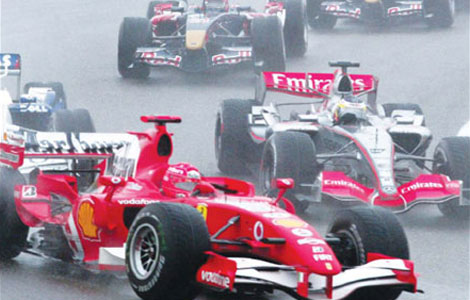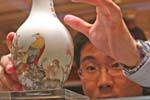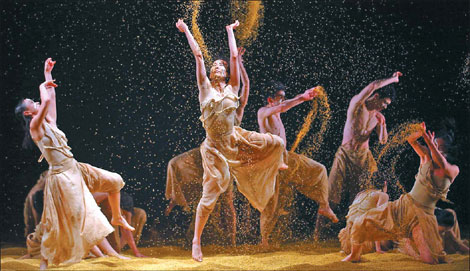People
Reaching for the heavens
Updated: 2011-04-08 07:56
By Raymond Zhou (China Daily)
|
Songs of the Wanderers is based on an Indian religious legend. Wang Xiaojing / For China Daily |
While the "cultural revolution"(1966-76) devastated Chinese culture, it left a positive mark on Lin Hwai-min, Asia's most celebrated choreographer. "I was in the US in the early 1970s, and like most youth I was enamored. What did I know? I took (the call to) 'serve the people' literally."
To this day, he firmly believes that art should remain close to the grassroots. He talks more about the open-air free shows he presents across Taiwan than the performing arts pantheons he has performed in Western countries. The best spectators, he says, are the ones who come up to him and say: "We did not understand the meaning of that specific segment, but we were moved to tears and it gave us goose-bumps."
When he founded Cloud Gate Dance Theater of Taiwan, in 1973, it was the first of its kind in the Chinese-speaking world. He had given up a budding career in fiction writing and embarked on a journey fraught with uncertainties. His passion for dancing was kindled at the tender age of 5 by the film The Red Shoes and was sharpened by a stint at the dance companies of Martha Graham and Merce Cunningham in New York.
"Dance is not your only way out. If you choose it, you must go the whole way. Taiwan does not need another amateur dancer," he said to himself early on. Against great odds, Cloud Gate was launched. From choreography to management, Lin had to perform all the duties. The audience for modern dance was so limited that he had to create as many as half-a-dozen new pieces each year.
Several times he was pushed to the brink of liquor-induced stupor and breakdown and had to be pulled back by friends.
One day, when he was riding a taxi, the driver refused to accept his fare, citing Cloud Gate's financial woes. "Mr Lin, you'll have to win some credits for us Taiwanese!," he said.
On another occasion, on a stormy night, a fellow passenger who was sharing a ride talked about the hardships of being a construction worker and concluded: "What profession does not involve hardship?"
If Lin Hwai-min's perseverance was a group effort, his artistic genius is mostly his own. Unlike most professionals, he did not receive rigorous and systematic training in dance from a young age. Fortuitously that might have helped expose him to a rich variety of influences.
While contemporaries of mainland Chinese were severed from their cultural heritage by the "cultural revolution", artists and intellectuals in Taiwan were steeped in traditional values and aesthetics. Lin was no exception. His early works were either adapted from great literature or inspired by it.
What is amazing is the way he respects long-established norms without kowtowing to them. One can easily detect the link between his version of the White Snake and existing operas, yet his interpretation of A Dream of Red Mansions is so bold the characters are like ethereal souls detached from their bodily existences.
Lin does not eschew social commentary in his work. He has created epic dance dramas that evoke Taiwan's distant or recent history and turmoil. His vignettes of life in modern Taiwan are equally enticing.
Over the years, Lin has shifted from a narrative focus to abstract meditation. Mood pieces such as Water Moon, Bamboo Dream and the Cursive trilogy have stripped the conventions of plotlines and characters to reveal an essence that most Chinese artists over the centuries have taken a lifetime to distill. These instant masterpieces are a throwback to the golden age of classical poetry, painting and calligraphy, yet they retain a sensibility that is modern and international. Western audiences have no difficulty absorbing them or bestowing accolades on them.
Lin calls the approach "subtraction", adding it is possible only with age when the superfluity of the world evaporates leaving just the bare essentials. Critics marvel that he has moved from Chinese symbolism to the quintessence of Chinese culture. Sometimes it is easier to see the spiritual dimension of the master than traces of his life story in his oeuvres. "The emotional kernel is there throughout," he explains self-effacingly, "and besides, there is nothing unique about my life."
The seamless fusion of traditional Chinese aesthetics and modern dance techniques has opened eyes both across China and in the West. However, Lin Hwai-min himself does not admit to any conscious East-meets-West effort. "I do not set out to do one style. Everything comes naturally," he reveals.
In Songs of the Wanderers, the sources are as diverse as a German book, folk music from Georgia, a trip to India and his own musings on Buddhist lore. "I was afraid Indian or Georgian members in the audience might pick fault, but they loved it," he says in a recent post-show Q&A session in Beijing.
Songs of the Wanderers is currently on tour in several Chinese cities after playing to rave reviews at Beijing's National Center for the Performing Arts.
When asked to predict which of his 80-plus works will be performed a century from now he says, "none". To give life to his artistic conception, dancers have to practice for years not just ballet and modern dance but tai chi, martial arts and calligraphy. "Who in his or her right mind will do that when I'm gone?"
He refrains from criticizing the mainland model of full funding for performing arts troupes by the State. "I would never accept full sponsorship. It always has strings attached. I prefer to get the bulk of my support from ordinary people," he insists.
Maybe that is why even elderly women who cannot tell modern dance from ballet have a visceral reaction when watching the feral movements thought up by Lin Hwai-min.
E-paper

Green light
F1 sponsors expect lucrative returns from Shanghai pit stop
Buying into the romance
Born to fly
Light of hope
Specials

Share your China stories!
Foreign readers are invited to share your China stories.

No more Mr. Bad Guy
Italian actor plans to smash ‘foreign devil’ myth and become the first white kungfu star made in China.

Art auctions
China accounted for 33% of global fine art sales.

